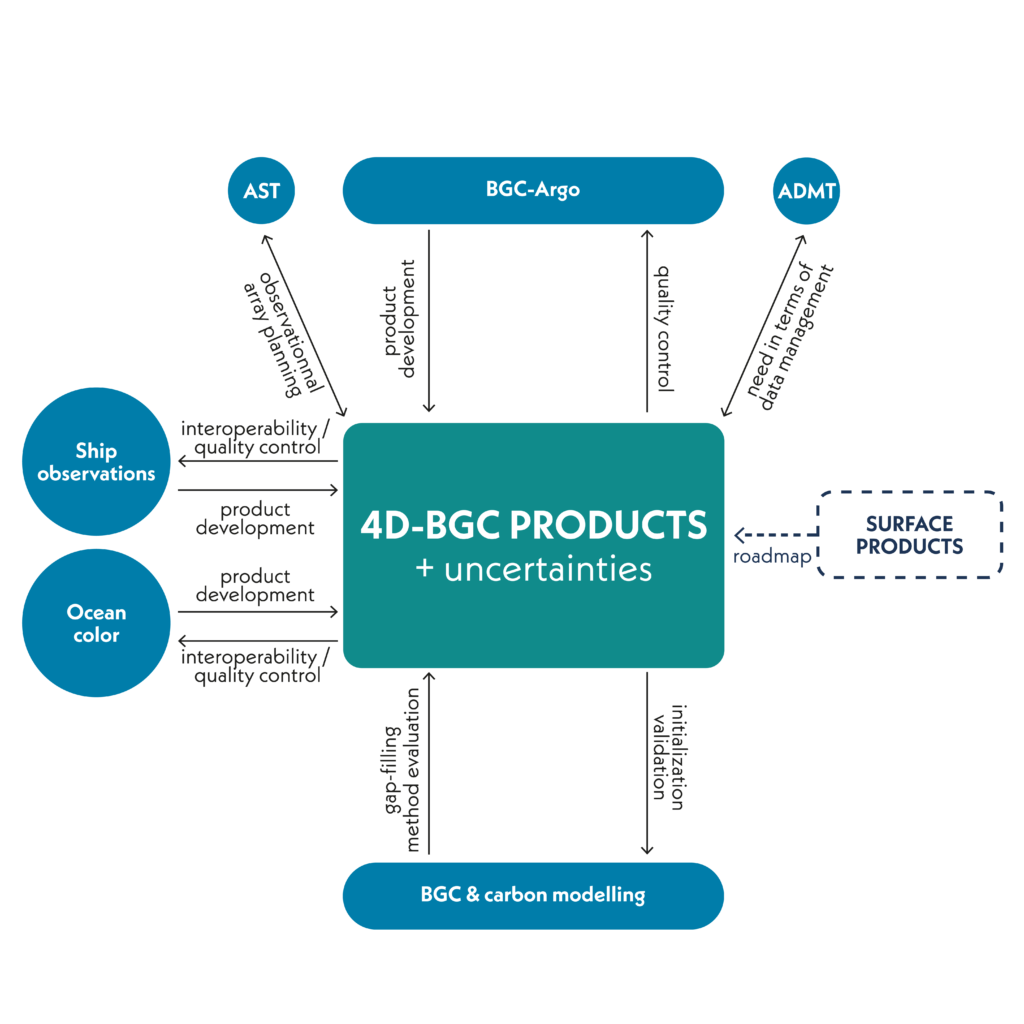
Substantial advances in oceanographic observation have been made in recent decades, allowing scientists to address questions relating to ocean physics and biogeochemistry on previously unattainable spatial and temporal scales. Remote sensing technology (1970s-pres.) has enabled highly resolved views of surface ocean properties and the Argo array (2000s-pres.) has generated unprecedented ocean interior temperature and salinity observations. The Biogeochemical (BGC) Argo array has grown over the early 21st century, and its planned expansion will soon generate ocean interior carbon, oxygen, nutrient, and optical data with near-global coverage. Four-dimensional (4D; latitude × longitude × depth × time), gridded, and gap-filled data products of these ocean interior properties are being developed. These products will enhance data accessibility and ease data interpretation, transforming our understanding of ocean biogeochemical processes such as carbon fixation, export and remineralization, ocean acidification, deoxygenation, and nutrient cycling. Regular updates to these 4D-BGC products will allow scientists and decision-makers to monitor changes to important biogeochemical processes in near-real-time. This group will facilitate discussion and coordination among different scientific communities around developing, validating, and distributing 4D-BGC products from observational datasets, with a focus on the BGC-Argo array. The ultimate goal of this initiative is to significantly enhance access and utility of BGC observations through 4D-BGC products, and thus refine our understanding of ocean biogeochemistry, improve models and reanalysis products, and inform policy decisions.
- Chair(s)
- Raphaëlle Sauzède (France), Jonathan Sharp (USA)
- Other Full Members
- Haimanti Biswas (India), Henry Bittig (Germany), Laique Djeutchouang (South Africa), Tetsuichi Fujiki (Japan), Lydia Keppler (USA), Rodrigo Kerr (Brazil), Jens Daniel Müller (Switzerland), Andrea Rochner (UK)
- Associate Members
- Lucile Duforêt-Gaurier (France), Hayley Evers-King (Germany), Katja Fennel (Canada), Peter Landschützer (Belgium), Siv K. Lauvset (Norway), Nicolas Mayot (UK), Alexandre Mignot (France), Peter Oke (Australia), Katherine Turner (USA), Xiaogang Xing (China-Beijing), Cunjin Xue (China-Beijing)
- Reporter
- Wee Cheah
- Terms of Reference
Establish connections among 4D-BGC product developers, observational communities and data synthesis efforts, and end-user communities. This will include planning method intercomparison exercises, developing strategies for merging observational datasets for 4D-BGC product creation, and ensuring that 4D-BGC products are co-developed with stakeholder input.
Compile an inventory of 4D-BGC products that highlights the original data and methodology used to create each one, provides data access information, and suggests relevant applications. Through this inventory, promote the broad distribution and use of 4D-BGC products in open-access format for public decision-making and scientific research.
Synthesize available estimates of global to regional magnitudes, variabilities, and trends of key biogeochemical processes that can be refined by 4D-BGC products, and identify actions that can be taken to achieve those refined quantifications. Example processes include carbon production and export, subsurface respiration, anthropogenic CO2 uptake, deoxygenation, ocean acidification, and nitrogen cycling.
Develop recommendations for methods to create, distribute, and dynamically update 4D-BGC products, as well as strategies to estimate uncertainties from grid-cell to global scales. These recommendations will promote the creation of consistent and reliable 4D-BGC products with well-quantified uncertainties.
Build capacity within the oceanographic community, especially among early career researchers and within underrepresented groups, to ensure 4D-BGC product development and usage is sustained and supported. This will involve training researchers on 4D-BGC product creation, uncertainty estimation, and product-model intercomparison.
- Approved
- October 2023
- Financial Sponsors
- SCOR, NSF
- Meetings
February 2024 in New Orleans, USA